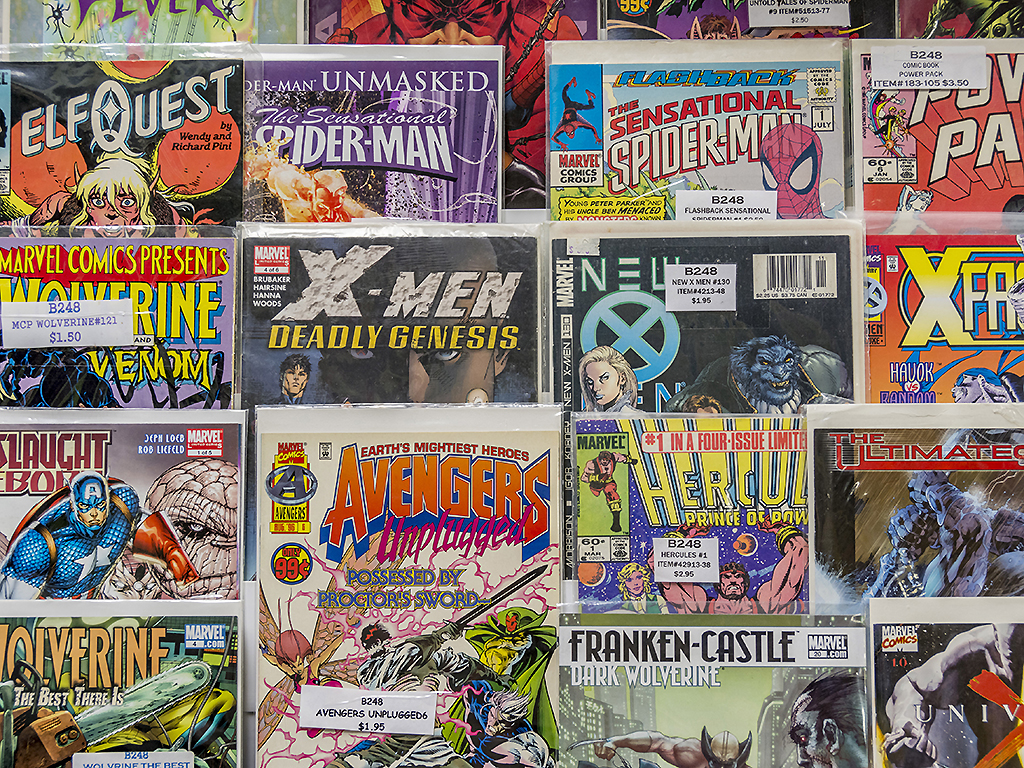Hardly a new phenomenon, Comicsgate (as it’s called online and around the water cooler) has been circulating and burgeoning since at least 2014.

Lately, it’s had a resurgence online, with the hashtag popping up here and there in conversation.
What is it, exactly?
Generally, it’s an online thing, a discussion that frequently turns ugly virtually and in real life; Comicsgate pushes the idea that the comic book industry — mainly laser-focusing on “biggie” creators DC Comics and Marvel — is motivated solely by political agendas, and as such it’s aiming to transform its long-running tradition of featuring white, heterosexual male comic-book characters into a more diverse spectrum. Think: more black characters and characters of colour, or increased gay and trans inclusion.
Diehard comics fans who ascribe to this belief are vehemently against the diversity push, saying that the demographic Comicsgate aims to please isn’t interested in comics anyway. So essentially, the comics industry is kowtowing to people who don’t even buy their wares. That’s the gist, anyway.
Most folks in the world of comics will tell you that Comicsgate isn’t even really about comics, per se, but rather an extension of the current political divide.
READ MORE: ‘Venom’ movie review
“Comicsgate is the political culture war come to comic books,” said Liana Kerzner, the former co-host of TV show Ed and Red’s Night Party, and creator of Lady Bits, a YouTube show about women in video games. “I know I’m supposed to be super-serious and sombre about this, but the whole thing is pointless on so many levels. Comic books are a relatively small industry, so readers personalize things to a degree that’s difficult for consumers of mainstream media to understand. Everyone who is a fan of comics has read a book that they felt was written just for them, and it’s like a drug.”
“Its inherent pointlessness is what seems to make it so heated,” she continued. “Comic-book readers have revolted over other stuff before — outrage over Dark Knight 2 not being very good, for instance; this nerd fight has caught the attention of the mainstream because it intersects with politics and our current collective fascination with the alt-right.”
Comics writer Ryan North agrees, saying it’s only garnering so much attention lately because the majority of people within the comics community want to distance themselves from the movement.
“It’s having a bit of a moment because several comics creators have come out recently and said, ‘In case there was any doubt, these guys are misguided, hostile, and don’t represent me at all,'” he said. “That’s drawn some attention to them, but they remain a small minority, given outsized attention because of their beliefs and aggressive tactics, particularly against women, cis and trans.”
Is this mostly about women in comics?
While some people might deny it, the majority of posts and social-media references to Comicsgate involve the depiction of women in the medium. Put simply, the “old school” comics fans, whoever they might be, resent the increase in the inclusion of women.
The majority of tweets, unshareable here due to vulgarity, refer to women as interlopers in the comics world — and that’s putting it nicely. The only positive is Comicsgate supporters, for the most part, are relatively invisible, hiding online or anonymously posting to sites. There is a strong contingent of anti-Comicsgate folks too, butting against the movement every day.
Within the comics community, North said, most people don’t think about Comicsgate until it impacts them in some way. That’s not necessarily a good thing, but at least, he asserted, he hasn’t seen much advocacy for it.
READ MORE: Johnny Depp claims Hollywood elite tried to bring him down, says he’s not a ‘violent man’
There’s always division over something in comics, agreed Kerzner, but in order to fully understand it you need to be a part of that world.
“You have to realize that there’s an identity component to fandoms, but it goes deeper than that,” she said. “For a lot of years, people who weren’t white men were kept out of jobs by systemic stuff. For instance, no woman could work on a Superman book because the editor was a serial sexual harasser. DC decided he was more important than any woman who wanted to write or draw Superman, and just didn’t hire women to work with him. They didn’t do anything about him until #MeToo gave them no other choice. I think you can see how resentment forms in conditions like that.”
“Of course there’s the other side too,” she continued. “Guys who felt like comics were a safe place to be a nerd, who felt it was a place where their opinion mattered, now feel like that’s been yanked away and they feel aggrieved. Some would respond ‘too bad’ to that, but I’m giving you the structural circumstances that led to Comicsgate being, essentially, a huge fight over nothing terribly important. There’s a psychological connection that geeks have with their media that’s really hard to understand unless you’re a geek.”
In February of this year, Comicsgaters released a public blacklist of names for followers to boycott, and almost all of the people on the list are left-wing, women or people of colour. It was allegedly made for “educational purposes only.”
READ MORE: Kanye West jumps on table at Detroit College, rants about Elon Musk
“You are advised not to engage in any harassment/doxing/Twitter trolling with these people,” read a statement by Comicsgate proponents. “The list is meant for all concerned with the state of comics to see who the main contributors are to the declining quality. The players in #Comicsgate are not responsible for your actions if you DO NOT take the advice of the above statement. If you want to hurt these individuals, do it with your wallet. Don’t buy their products. Do not give the false reporter any clicks. Use archive.ie for any ‘reporter’ links.”
Needless to say, many Comicsgate people didn’t follow those instructions.
Is this at all affiliated with Gamergate?
Gamergate — yes, another “gate” — is an online-born controversy that started up in 2014, predating Comicsgate. Gamergate supporters believe there is a strong influx of females and feminism inundating the gamer world, another perceived vestige for white men. Additionally, supporters say there’s unethical collusion between the media and said feminists, along with others pushing for diversification.
The pro-Gamergaters are known for their ruthless online harassment of people they perceive to be pushing this agenda. That includes doxxing, the release of one’s personal information (real name, address, etc.) into the public sphere. To make things even more complicated, Gamergate supporters usually deny the harassment took place or accuse the victim of manufacturing the abuse.
With some similarities, it seems like the two are intertwined; Kernzer says they are, but only “kind of.”
“There are some participants in common, but Gamergate did have some seeds of valid concern regarding ethical journalism and corporate practices,” she said. “They just got swallowed up by the culture war. Comicsgate is all culture war.”
WATCH: ‘It’s a bird… it’s a plane’: Looking at how comics became a tool for literacy and art
“The other disturbing thing about Comicsgate is how involved creators have been,” she continued. “Most video game developers wisely stayed out of Gamergate. The ones who did engage rarely got down in the muck with the culture warriors. I think Comicsgate is being driven by a lot of behind-the-scenes feuds between creators coming out in the open, and there’s an ugliness to it which indicates that the comic book industry, as a whole, still has a lot of growing up to do. Some of the stuff I’ve seen has just been juvenile. We’re very lucky to work in some pretty fun industries and fighting with people all the time is a great way to show you’ve lost sight of that fun.”
Global News reached out to at least a dozen comic book writers, creators and artists for their opinions about Comicsgate, and the majority of them turned the offer down flat. The reason? They didn’t want to give Comicsgate any press or coverage. Indeed, for the most part, the comics world just wants this to go away.
“The whole ‘gate’ suffix is ridiculous,” said North. “It doesn’t mean anything: there’s no scandal here. Watergate had a break-in. ‘Gamergate’ at least had the (thoroughly discredited) idea that there was something fishy around ‘ethics in game journalism.’ ‘Comicsgate’ has nothing — no scandal, no event, nothing to prove and nothing to deny — beyond ‘I don’t like some comics and would like for them not to exist.'”
“My opinion of Comicsgate is that there are no winners in it and never will be,” agreed Kernzer. “It’s much more productive to praise the books you enjoy to give them word of mouth publicity. That way, other people will sample them, and the market will reward good work. No fighting on the internet required!”
—







Comments